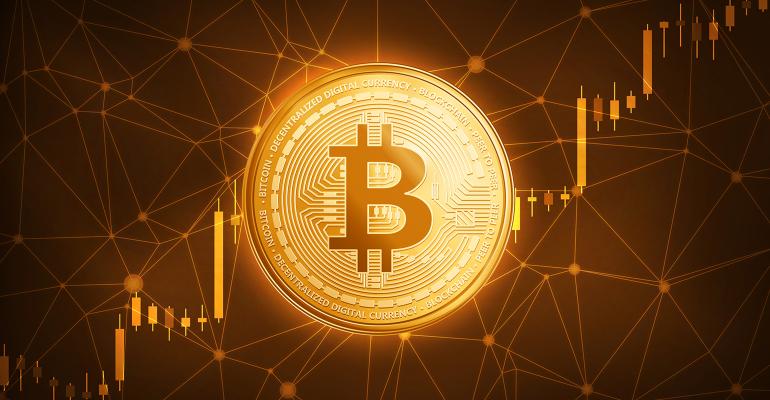(Bloomberg) -- Bitcoin has shot to a record just as billions of institutional dollars have fled gold.
Whether that’s a simple coincidence or the start of a rotation that would have a profound impact on crypto and the precious-metals market is impossible to know for sure. But the debate is now heating up on whether the world’s largest digital currency can one day rival bullion as an inflation hedge and portfolio diversifier.
Bitcoin’s tumble last week, the biggest since March, after a 150% run-up this year underscores the famous volatility of the asset class that has kept mainstream investors at bay. Yet if they start moving just a small portion of their gold holdings into the $350 billion Bitcoin industry, it would be a game-changer for diversification strategies on Wall Street.
Bitcoin Fights Back With Power, Speed and Millions of Users
“Gold was really the safe asset of the past world and baby boomer generation,” said Jean-Marc Bonnefous, a former commodities hedge fund manager turned crypto investor. “Now it’s being replaced by automated assets like Bitcoin.”
The digital currency is a trading ground for a motley crew of retail players, speculative pros and exotic quants, while traditional investors have hitherto stayed on the sidelines. That seems to be changing with Guggenheim Partners LLC just the latest manager to join the bandwagon, alongside Paul Tudor Jones and Stan Druckenmiller.
Funds like family offices are selling their gold exchange-traded funds holdings for the digital currency, according to analysts at JPMorgan Chase & Co. Bullion-backed funds have dropped 93 tons of metal, worth some $5 billion since Nov. 6. Grayscale Bitcoin Trust, the preferred vehicle for institutional investors, has doubled in dollar terms since the start of August.
Bitcoin Revival Unleashes Animal Spirits and $300,000 Forecast
Bitcoin’s market capitalization is currently only 3.1% the size of gold, according to James Butterfill, investment strategist at CoinShares, which sells investments in digital currencies. If that increased to 5%, it would imply a price of $31,300 compared to around $18,700 currently, he estimated.
“Bitcoin is establishing itself as a credible store of value,” Butterfill said. “This is particularly appealing during this time of unprecedented loose monetary policy. For these reasons investors are naturally comparing it to gold.”
Still, there are good reasons for bullion’s poor performance recently, like progress toward a coronavirus vaccine that has reduced demand for havens. With market-derived inflation expectations relatively stable, one conclusion might be that gold is simply moving along with animal spirits, while Bitcoin has been in a speculative fervor.
The latter has also found a fan at the world’s largest asset manager -- evidence of its growing appeal on Wall Street. The currency is “here to stay” backed by demand among millennials and its strength as a medium of exchange, BlackRock Inc. Chief Investment Officer for Fixed Income Rick Rieder told CNBC in a recent interview. Trading Bitcoin “is so much more functional than passing a bar of gold around,” he added.
One of the differences between the two is that all transactions can be viewed on the blockchain, while a large part of gold trade takes place on London’s over-the-counter market, where less data is available.
“The transparency in Bitcoin is helping drive a lot of interest,” said Lyle Pratt, an independent investor who owns Bitcoin. “Gold is kind of like a blackbox, you have to trust the custodians to tell you about any flows in the market.”
For Plurimi Wealth LLP’s Chief Investment Officer Patrick Armstrong, who allocates 6.5% of his discretionary funds into gold, even if Bitcoin has potentially bigger upside in an inflationary spiral, the risks are just too big. Gold also has a long history as a store of value that Bitcoin can’t match. There’s always the nagging suspicion that another, potentially central-bank backed, digital currency could supplant it.
“If the debasement trade works, it is very possible Bitcoin works better,” he said. “But it is also possible Bitcoin has no value in years to come, while I do not think the same can be said of gold.”
One thing that’s clear is Wall Street is taking Bitcoin seriously in a way that it didn’t in 2017. “I have changed my mind!” wrote Sanford C. Bernstein strategist Inigo Fraser-Jenkins in a report Monday. Bitcoin won’t replace gold, but there’s room for both, he said, especially if the future is one of inflation and extreme debt levels.
“I see it as being complementary,” he said in an interview. “Whatever one’s starting position was before the pandemic in terms of what your gold and crypto allocation should be, I think it should be materially larger now.”
--With assistance from Eddie van der Walt and Vildana Hajric.





